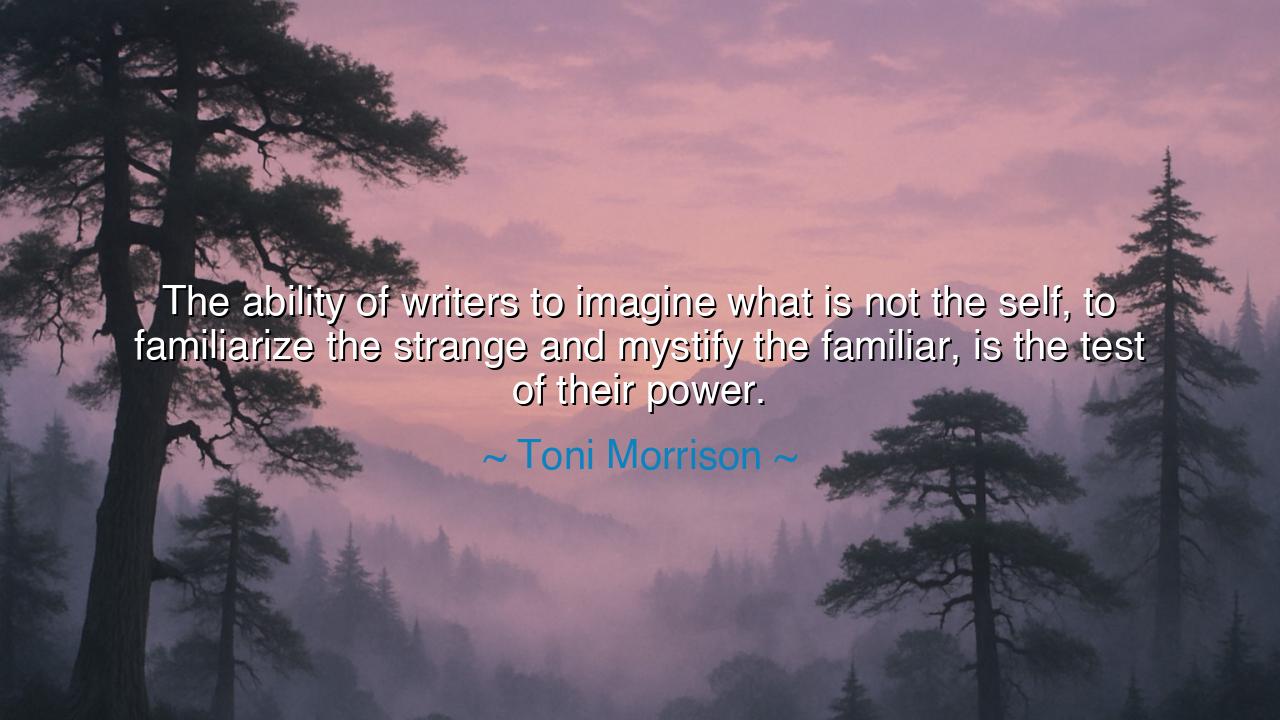
The ability of writers to imagine what is not the self, to
The ability of writers to imagine what is not the self, to familiarize the strange and mystify the familiar, is the test of their power.






The words of Toni Morrison—“The ability of writers to imagine what is not the self, to familiarize the strange and mystify the familiar, is the test of their power.”—resound as a sacred charge to all who dare to shape worlds with words. She reminds us that true power in writing does not lie in retelling one’s own reflection endlessly, but in stepping beyond it—to enter the lives, the sorrows, and the dreams of others. The writer is not only a mirror but also a window, opening vistas to what lies outside the narrow walls of the self.
This utterance speaks of the dual gifts of literature: to familiarize the strange and to mystify the familiar. In the first, the writer takes what is foreign, distant, or feared, and renders it close, human, and comprehensible. In the second, the writer takes what is ordinary and infuses it with wonder, revealing the hidden depths beneath the surface of daily life. The mastery of this balance—compassion for the unknown and awe for the known—is the mark of the greatest voices.
History gives us the luminous example of Homer. In the Odyssey, he made the strange—gods, monsters, and enchanted isles—feel vivid and real, shaping the myths of a people. Yet he also mystified the familiar: the longing for home, the bond of husband and wife, the pain of exile. By transforming both the strange and the ordinary, Homer’s work endured for millennia, proving the power Morrison describes.
The quote also reminds us that this imaginative leap is not mere art, but an act of moral courage. To enter into “what is not the self” is to cultivate empathy, to remind readers that no life is too distant, no voice too small, to be worthy of attention. Likewise, to unveil the mystery of the everyday is to awaken readers to the wonder of their own lives, urging them to see with new eyes what they once dismissed as mundane.
Let this wisdom endure: the writer’s task is not only to tell stories but to expand the soul of the world. The true test of their power is their ability to reach across boundaries, to give voice to the voiceless, and to breathe enchantment into the plainest truths. As Toni Morrison teaches, the writer is both translator of the strange and enchanter of the familiar. In that sacred tension lies the alchemy of literature, and the eternal gift of those who write.






PBHue Pham Bich
I’m struck by how this view elevates imagination to almost a moral act. It makes me wonder whether the best writers are those who can hold empathy and curiosity at the same time. But how does one sustain that openness without losing their own sense of identity in the process? Can deep imaginative engagement with others ever blur the line between self and other too much?
OOanh
This makes me think about the moral dimensions of writing. If a writer’s power is tested by how well they imagine what’s beyond themselves, what happens when they fail to do it responsibly? Can the act of misrepresenting others through limited imagination cause real harm, or is artistic intent enough to justify it? It’s such a complex balance between creativity and accountability.
VTlo van ton
I love how this idea expands what it means to be a writer. It suggests that writing isn’t just about self-expression, but about transformation—turning the strange into something we can feel and the ordinary into something mysterious again. Do you think this is why some stories stay timeless? Because they constantly reshape how we understand what it means to be human?
LKVu Lam Khanh
Toni Morrison’s words make me reflect on how writers act as bridges between worlds. I’m curious—how does a writer find the balance between honoring authenticity and taking creative leaps into perspectives that aren’t their own? Especially today, when writing outside one’s lived experience can be controversial, how can imagination and respect coexist in storytelling?
TꪜTan Tai ꪜ
I find this quote both inspiring and intimidating. If true power in writing comes from imagining what isn’t the self, does that mean empathy is the most essential skill for a writer? It makes me think about how much of writing is emotional rather than technical. Can someone truly write beyond their own experience without first understanding themselves deeply?